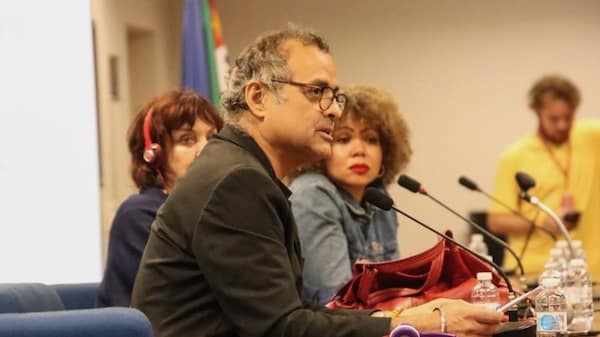The IV International Dilemmas of Humanity Conference: Perspectives for Social Transformation kicked off in São Paulo, Brazil on April 7. The gathering, which will run until April 10, aims to “discuss and propose concrete economic and social solutions to the various crises caused by capitalism and neoliberalism worldwide, including actions to combat hunger, social inequalities, and the environmental crisis.”
The conference is organized by the International Peoples’ Assembly, the Landless Rural Workers’ Movement (MST), and the Tricontinental: Institute for Social Research.
The opening panel, held at the Pontifical Catholic University of São Paulo, sought to ground participants in the goals of the conference itself. Speakers on the opening panel, Miguel Stedile, Claudia de la Cruz, Vijay Prashad, and Eduardo Suplicy, emphasized that the discussions are not merely academic, but seek to form concrete theories and solutions in response to the urgent needs of the Global South, which is struggling to emancipate its peoples and nations from debt servitude and underdevelopment.
In the opening panel, speakers also emphasized that Israel’s ongoing genocide in Gaza is the starkest indictment of the failure of the current international system. Vijay Prashad, Executive Director of Tricontinental: Institute for Social Research, declared that the world is in a new moment, and it is “defined by the genocide in Palestine, which reveals to us this international division of humanity, some people have lives that are precious and some people are disposable.”
Claudia de la Cruz, Executive Director of the Interreligious Foundation for Community Organization (IFCO), stated that over the 18 months of genocide, the people of the United States, the biggest backer of Israel, have stood firmly in rejection of U.S. and Israeli policy:
People have realized that the same people that attack working class people every day are the ones financing the killing of babies in Gaza.
Sustainable development has failed
Participants emphasized that there is an undeniable, deep, systemic crisis affecting the entire world, and the solutions proposed not only by the right-wing, but also liberal and NGO sectors in government and international institutions, are all falling short.
Vijay Prashad, the executive director of Tricontinental: Institute for Social Research, reminded participants that the failure of the United Nations to meet its promise of achieving 17 sustainable development goals by 2030, is a clear indicator that current frameworks for achieving human advancement and development are insufficient. The goals of eradicating poverty, creating gender equality, ensuring decent work, promoting economic growth, advancing industry, innovation, and infrastructure, among others, were established by UN member states as key markers of “peace and prosperity for people and the planet”.
But, Prashad highlights,
the UN said itself that we are not only not going to meet those goals, but the worst elements of human misery like hunger, poverty, houselessness, are now expanding.
This, according to Prashad, is due to a fundamental flaw in the view of how development should be financed and achieved. The majority of the nations of the Global South today are forced to forfeit economic development to debt servicing. “Almost 98% of payments received for exports of developing countries are used to service the debt of European and U.S. bond holders,” he condemns, emphasizing,
Almost every dollar that a country earns by selling commodities is paid to bondholders of Europe and the United States.
This, he argues, should raise an existential question:
What is the point of selling natural resources? You’re just doing it to pay off your bond holders, not to enrich your own country.
Prashad insists that the world needs a new framework to think about development, one where Global South nations are not digging themselves into a bottomless pit of debt, but are able to use their resources to strengthen national sovereignty and advance human progress. In this regard, he proposed seven points towards a sovereign development plan.
These points include:
- A ban on the export of unprocessed raw materials, similar to Indonesia’s action with nickel.
- A ban on transfer pricing, the profit shifting activities of multinational corporations that allows them to refuse to pay taxes and to pay low royalties.
- Adopt strict capital controls and seize assets held in illicit tax havens.
- Adopt ceilings on the interest rates that commercial and multilateral lenders charge developing countries and regulate interest rates that domestic banks charge for such social goods as housing loans.
- Implement tight regulation for pension funds so that the savings of the people are not used recklessly for financial speculation and gradually create public sector pension funds.
- Create a Remittance Bank to convert income for consumption into savings for investment and infrastructural development, as Mexico has done.
- Create conditions for Foreign Direct Investment, such as reinvestment of profits in the country where they operate, hire and train the domestic labor force, transfer technology, use their expertise to develop the value chain within the country, and build infrastructure.
Discussions in the coming days seek to expand and deepen such a plan, in dialogue with movement leaders, members of progressive governments, and academics.
Prashad affirmed,
We cannot imagine social transformation without a program that includes a materialist understanding of transformation. We move. But we move with clarity and confidence. That means we need to be clear about our present and clear about the program for the present toward the future. And we need to have confidence in that program. So, let’s go forward and build it.

